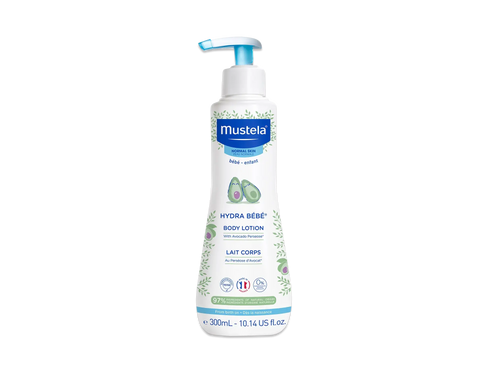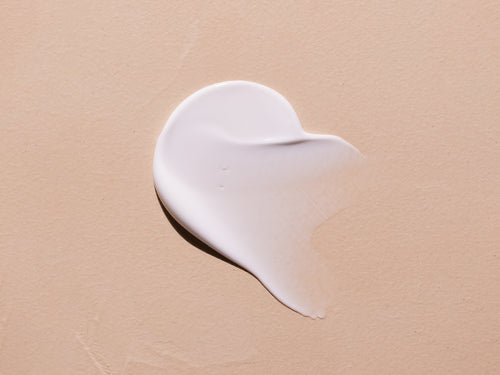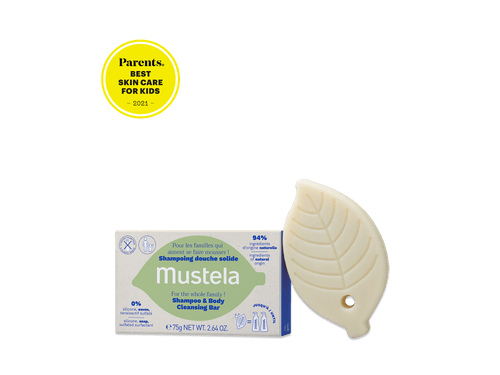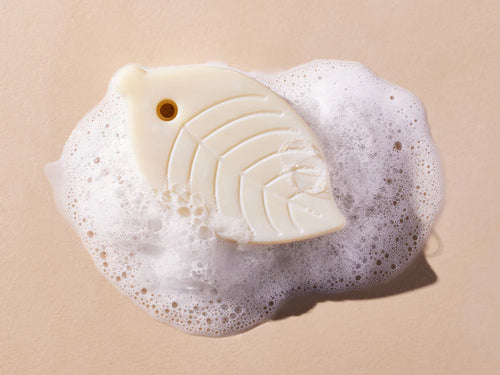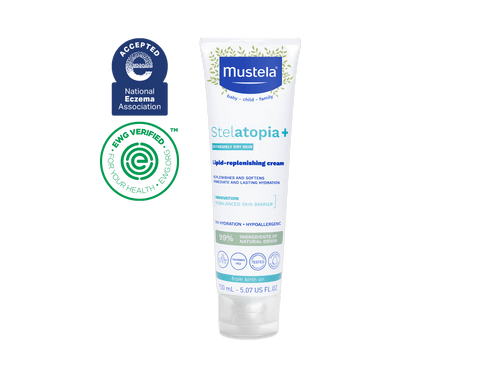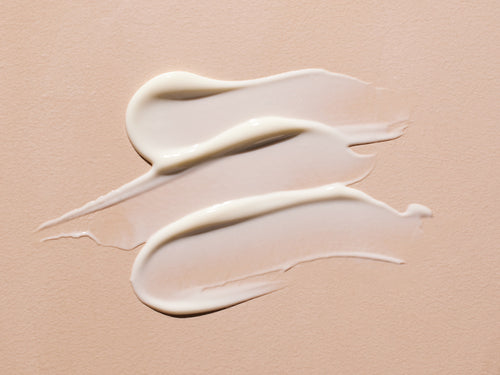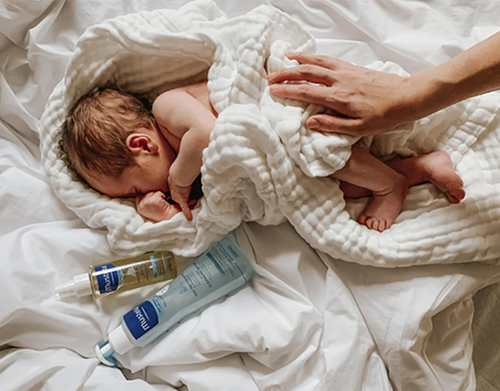Welcoming a newborn baby into your family is an exciting, emotional, and often confusing time. Along with all the joy and love new parenthood brings, there are many concerns you’ll face once your little one makes his or her appearance in the world.
You’ll likely spend a big chunk of time decorating a safe and comfortable nursery for your baby. You’ll stock the room with things like blankets, toys, diapers, wipes, necessary lotions and baby skin care products, clothing, and more. You’ll be prepared for whatever life decides to throw at you once your baby is in the mix.
But with all of that planning and preparing, have you taken a moment to consider the types of skin care products that you are stocking up on? You might not know what you’re dealing with when it comes to complicated ingredients in these products, such as phenoxyethanol.
In this article, the baby experts at Mustela will teach you all about phenoxyethanol — what it is, where it’s found, and whether or not it’s safe for you and your baby. After all, one of your biggest goals as a new parent is definitely to keep your baby safe, healthy, happy, and out of harm’s way.

What Is Phenoxyethanol?
Phenoxyethanol is a naturally occurring chemical that can be found in green tea, but, commercially, it’s also a synthetically produced “nature identical” chemical.
Phenoxyethanol is created by treating phenol with ethylene oxide in an alkaline medium. The combination reacts to form a pH-balanced chemical that is often used in products like shampoos, cosmetics, and lotions as a preservative alternative to parabens.
Phenoxyethanol is considered a “glycol ether.” Glycols are chemicals that find their way into all sorts of things: paint, lacquer, cleaning products, jet fuel, and even products marketed for newborns and children. It’s also used as an anti-bacterial and stabilizer in many other household products.
This chemical has become increasingly popular over the last few years since concerns have been raised about parabens and their potential dangers. Still, that doesn’t necessarily mean that phenoxyethanol is safe itself. Concerns about its toxic capabilities (especially in the blood and liver) have been raised by many, and more research is needed to uncover the whole truth about its properties.
Let’s dive in and take a closer look at what phenoxyethanol does, where it’s found when it comes to you and your little one, why there’s a cause for concern, and what you can do about it.
What Does Phenoxyethanol Do?

For all good and intended purposes, phenoxyethanol fights bacteria. When it comes to skin care products, most are made with water and a variety of nutrients, creating a potential breeding ground for harmful microorganisms.
What’s worse is that the skin care products you use might smell and look just fine but could actually be swarming with bacteria or fungi that are dangerous to your and your baby’s health. Preservatives like phenoxyethanol are added to many of these products to combat the growth of harmful bacteria and fungi.
Still, many companies are opting to swap out chemical ingredients, like this preservative, due to their potential toxicity. All of Mustela’s baby creams and lotions, for example, are crafted with an average of 95-percent plant-based ingredients, such as coconut oil, sunflower seed oil, and shea butter while being phenoxyethanol free.
All of Mustela’s products are developed with healthcare professionals and are formulated to be hypoallergenic and free of parabens, phenoxyethanol, phthalates, and alcohol.
Why Is Phenoxyethanol Ever Used?
Phenoxyethanol is used by some companies as a “safe” alternative to formulas that include parabens and formaldehyde-releasing preservatives. Both are classes of chemicals with evidence of potential health risks that could have the ability to impact you and your little one.
Phenoxyethanol is also convenient because it doesn’t react with other ingredients, air, or light — making it appear to be an especially effective preservative.
When you’re checking ingredient lists, you may find phenoxyethanol in certain moisturizers, eyeshadows, foundations, sunscreens, conditioners, mascaras, eyeliners, shampoos, hair dyes, lip balms, body washes, nail polishes, baby wipes, baby lotions, soaps, shaving creams, deodorants, toothpaste, and more — the list really does go on.
What is often overlooked, though, is that phenoxyethanol's Material Safety Data Sheet (MSDS) says that it’s harmful if swallowed, inhaled, or absorbed through the skin and that it can cause reproductive damage.
This becomes especially alarming when you think about your newborn baby, whose delicate skin is very open to absorbing the products that you apply.
What Is The Concern About Phenoxyethanol?

There have been several studies that demonstrate phenoxyethanol’s toxicity, with effects on the brain and the nervous system even at moderate concentrations.
Phenoxyethanol breaks down to phenol and acetaldehyde, and acetaldehyde converts to acetate. Phenol can disable the immune system's primary response mechanism. Acetaldehyde occurs during the breakdown of ethanol and is a suspected carcinogen. Inhalation studies have shown irritation of the eyes, skin, and respiratory tract.
U.S. Environmental Protection Agency (EPA) data sheets, for example, show chromosomal changes and genetic mutation effects in testing, as well as testicular atrophy and interference with reproductivity in mice. Phenoxyethanol, in turn, has the potential to disrupt the human reproductive system.
Likewise, the European Union classifies it as an irritant, and a study by Europa EU demonstrates that phenoxyethanol can cause harmful reactions at low doses, as well as allergies. When you look at the facts of the matter, there are over 3,000 known allergens that have been studied. Of those, phenoxyethanol ranks in the top 10 most harmful.
Protecting You And Your Newborn From Phenoxyethanol

When it comes to preservatives and other potentially harmful chemicals that may be lurking in the products you choose for yourself and your little one, it’s always better to play it safe than to be sorry later. Protect your family by switching to phenoxyethanol-free products.
For Expecting Mothers And New Moms

Evidence suggests that phenoxyethanol, when absorbed by your skin, can lead to reproductive issues and damage to an underdeveloped fetus. So how can you protect your unborn baby?
Start by treating yourself to plant-based personal care products that will moisturize your skin, reduce itching, and keep you comfortable without the use of chemicals.
Specially formulated for new and expecting mothers, Mustela’s Soothing Moisturizing Balm moisturizes and helps reduce sensations of tightness and itchiness thanks to its unique formulation that includes ingredients of natural origin, such as avocado peptides and ceramides.
Safe for both moms and babies during prenatal and postpartum pregnancy, the Mustela Soothing Moisturizing Balm doesn’t contain parabens, phthalates, phenoxyethanol, bisphenols A and S, caffeine, or alcohol.
For Your Baby

The same safety measures, if not more, should be taken when it comes to your baby’s skin care routine. Opt for naturally derived products that do not utilize potentially harmful chemicals, like phenoxyethanol.
First and foremost, Mustela is committed to safety. After all, there’s nothing more precious than your baby! Would you want to take a chance on your baby’s health by using products with sketchy chemicals?
Instead, opt for wholesome skin and bath products, like Mustela’s 2 in 1 Cleansing Gel. Its ingredients ensure safety, security, and, most importantly, a clean, happy, and healthy little one!
Living Healthy And Happy

To keep yourself and your baby healthy, it’s crucial to stay committed to skin and health care products that use safe, effective, and natural ingredients.
Whenever possible, steer clear from the ingredient phenoxyethanol in your and your baby’s creams, lotions, shampoos, and other skin care products. After all, with the many potential concerns surrounding phenoxyethanol, would you really want to risk you and your baby’s health and wellbeing by using an (easily avoidable) chemical?
Remember, living healthy and happy means ensuring safety and the best-of-the-best skin care! That’s why it’s important to start with gentle, chemical-free products right from the get-go to keep both you and your baby comfortable and healthy.
Stick with natural products to ensure a healthy and happy life for both you and your little one.



